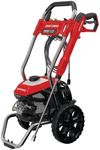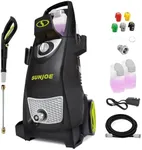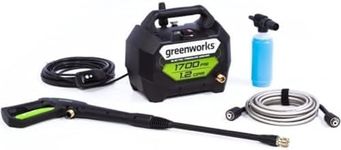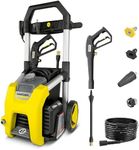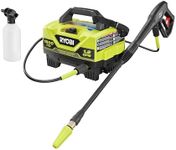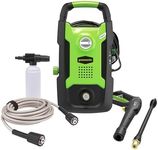Buying Guide for the Best Car Pressure Washers
Choosing the right car pressure washer can make cleaning your vehicle much easier and more effective. The key is to find a model that matches your cleaning needs without being too powerful or too weak. Think about how often you plan to use it, the size of your car, and whether you want to use it for other tasks around the house. Understanding the main features will help you make a smart choice that keeps your car looking its best while being easy to use and maintain.Pressure (PSI)Pressure, measured in PSI (pounds per square inch), tells you how forceful the water stream will be. This is important because too little pressure might not clean well, while too much can damage your car’s paint. Light-duty washers (up to 1500 PSI) are gentle and good for small cars or light dirt. Medium-duty (1500-2500 PSI) works well for most cars and regular cleaning. Heavy-duty (above 2500 PSI) is usually more than you need for cars and is better for tough jobs like cleaning driveways. For most car owners, a medium-duty washer is the safest and most effective choice.
Water Flow Rate (GPM)The water flow rate, measured in GPM (gallons per minute), shows how much water the washer uses. A higher GPM means more water is used, which can help rinse away dirt faster. Low GPM (under 1.5) is slower but uses less water, while higher GPM (1.5-2.5) cleans faster but uses more water. For car washing, a moderate GPM is usually best, as it balances cleaning speed and water use. If you want to finish quickly, look for a higher GPM, but if you want to save water, go lower.
Power SourcePressure washers can be powered by electricity or gas. Electric models are quieter, lighter, and easier to maintain, making them great for home use and car washing. Gas models are more powerful and portable but are heavier, noisier, and need more maintenance. For most car owners, an electric pressure washer is the best fit because it’s easy to use and provides enough power for cleaning vehicles.
Nozzle TypesNozzles control the shape and strength of the water spray. They usually come in different colors or numbers, each giving a different spray angle. A narrow angle (0-15 degrees) is very strong and can damage paint, while wider angles (25-40 degrees) are gentler and better for cars. Some washers have adjustable nozzles or come with several tips. For car washing, always use a wide-angle nozzle to avoid harming the paint, and look for a washer that includes these options.
Portability and SizeThe size and weight of the pressure washer affect how easy it is to move and store. Smaller, lighter models are easier to carry and store, which is helpful if you have limited space or need to move the washer around your yard. Larger models may have wheels for easier movement but can be bulky. Think about where you’ll use and store the washer, and choose a size that fits your space and strength.
Hose LengthThe hose length determines how far you can reach from the machine without moving it. Short hoses (under 20 feet) may require you to move the washer often, while longer hoses (20-35 feet or more) give you more freedom to move around your car. If you have a large vehicle or want to clean without dragging the washer, look for a longer hose.
Detergent SystemMany pressure washers have a built-in detergent tank or a way to add soap. This makes it easier to apply cleaning solutions to your car. Some systems mix soap automatically, while others require you to switch nozzles or use a separate attachment. If you want to use soap for a deeper clean, look for a washer with a simple and convenient detergent system.
